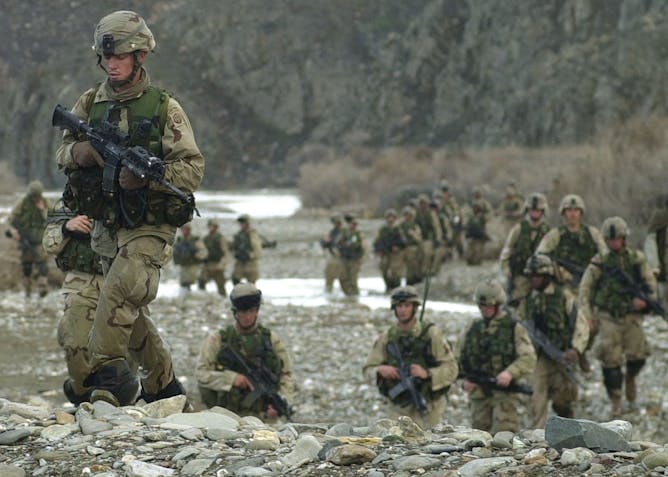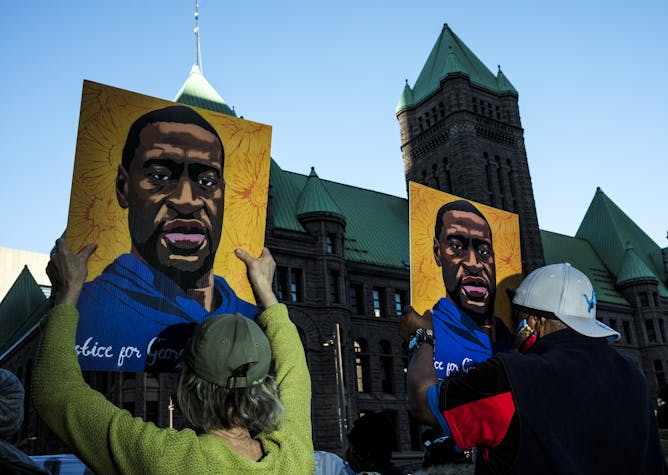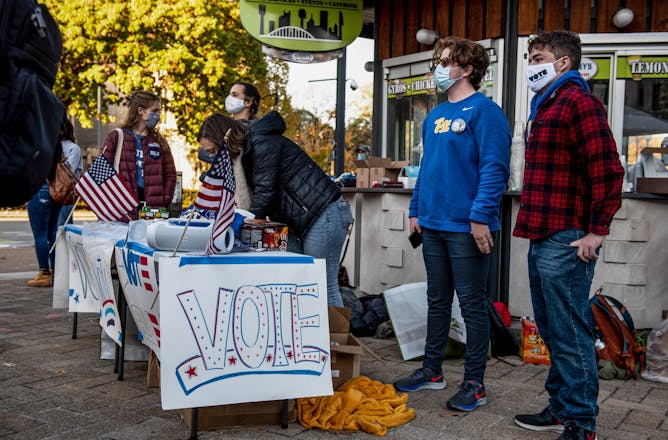|
|
|
|
Politics news has been relentless this past week. With so many different stories dominating the daily – sometimes hourly – headlines, we chose to go deep on a couple of them.
On Tuesday, news broke that President Biden had set Sept. 11, 2021 as the last day U.S. troops would be present in Afghanistan. The pullout put an ending point on this country’s longest war – a war that had a clear initial focus, but whose purpose became obscured over time.
Editor Catesby Holmes has spent years building up a stable of scholars who have helped illuminate various aspects of the conflict in Afghanistan. So she quickly offered to do what we call an “Essential Read,” where an editor pulls together a number of stories on a specific subject and writes a narrative that walks the reader through each of them. Catesby wrote in her introduction that “the war in Afghanistan has been long, complicated and deadly, and the road to peace fraught. Here are five stories explaining the history of the Afghan conflict and the faltering peace process.” The stories range from how the U.S. ended up in a war with the Taliban
to what the U.S. withdrawal could mean for the rights of Afghan women and girls.
The continuing drama – and for many, the continuing trauma – of the Derek Chauvin trial was the other story we dove into this week. Chauvin is charged with murder and manslaughter in the death of George Floyd. We wanted a scholar to look at how the formal legal process of a trial contrasted with the public discussion of racial justice around Floyd’s death and the death of Black men in encounters with police. Could a trial achieve racial justice? Philosopher Lewis R. Gordon at the University of Connecticut tackled this difficult question, setting out the stakes in his lead paragraph: “There is a difference between enforcing the law and being the
law. The world is now witnessing another in a long history of struggles for racial justice in which this distinction may be ignored.”
|
Naomi Schalit
Senior Editor, Politics + Society
|

|
|

Long time there: U.S. troops maneuver around the central part of the Baghran river valley as they search for remnants of Taliban and al-Qaida forces on Feb. 24, 2003.
Aaron Favila/Pool/AP Photo
Catesby Holmes, The Conversation
The Afghanistan War now has an end date: 9/11/21. Experts explain the history of US involvement in Afghanistan, the peace process to end that conflict and how the country's women are uniquely at risk.
|

A demonstration outside the Hennepin County Government Center in Minneapolis on March 29, 2021, the day Derek Chauvin’s trial began on charges he murdered George Floyd.
Stephen Maturen/Getty Images
Lewis R. Gordon, University of Connecticut
There's a divergence in how a trial is conducted, what rules govern it – and the larger issue of racial justice. That divergence affects the legitimacy of any verdict.
|

These students at the University of Pittsburgh urged their peers to vote in the 2020 presidential election.
Aaron Jackendoff/SOPA Images/LightRocket via Getty Images
John A. Tures, LaGrange College
Civics education is not boosting youth voting, volunteering or even scores on academic tests about government – and may be related to QAnon support.
|
|
|
-
Timothy Hamilton, University of Richmond
It's meant to stop something known as 'carbon leakage,' but the solution has economic, legal and environmental consequences.
-
Ying Liu, USC Dornsife College of Letters, Arts and Sciences
Since the beginning of the pandemic, hate crimes targeting Asian Americans have gotten increased media and public attention. New data shows these events are in fact happening more often.
-
Erika Frydenlund, Old Dominion University; Jose J. Padilla, Old Dominion University; Katherine Palacio, Universidad del Norte
Though not a rich country, Colombia is unusually well equipped to handle mass migration because of its own history with political strife and displacement.
-
Vasabjit Banerjee, Mississippi State University
The U.S. is broken up into 50 states, plus territories like Puerto Rico and Guam, and a federal district, Washington, D.C. Most other countries have smaller parts too.
-
Angela Bradbery, University of Florida
Consider the bill known as the Stark Naked Act of 1997, one of many pieces of legislation with curious, perhaps manipulative, names.
|
|
| |
| |
| |
| |
| |
| |
|
|
|
|
|
|
|